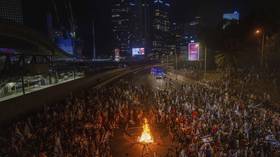
Had Washington simply enforced its own stance on settlements in occupied territories, the current crisis would not have been possible

Robert Inlakesh is a political analyst, journalist and documentary filmmaker currently based in London, UK. He has reported from and lived in the Palestinian territories and currently works with Quds News. Director of ‘Steal of the Century: Trump’s Palestine-Israel Catastrophe’.
Robert Inlakesh is a political analyst, journalist and documentary filmmaker currently based in London, UK. He has reported from and lived in the Palestinian territories and currently works with Quds News. Director of ‘Steal of the Century: Trump’s Palestine-Israel Catastrophe’.
@falasteen47

People protest against the Israeli government’s judicial reform plan in Tel Aviv on July 27, 2023 © JACK GUEZ / AFP
The passing of the first piece of Israel’s controversial judicial overhaul legislation has ushered in a cascade of crises for the entire state, economically, militarily, socially and politically. However, at the root of the current tensions are people the US could have stopped if it had adhered to its own policy positions.
On Monday, the Israeli Knesset passed into law the first stage of the government’s judicial reform, an amendment canceling the so-called ‘Reasonableness Clause’ that allowed the country’s Supreme Court to block legislation. The amendment was passed 64-0, with the Israeli opposition members boycotting the vote. This came against the backdrop of mass street protests against the legislation and even violent encounters with supporters of the judicial overhaul and the police.
Israeli protesters have gathered in tens, hundreds, and even thousands, every Saturday since January 7, calling on Prime Minister Benjamin Netanyahu to stop the plan to curtail the powers of the judiciary. Over the past weeks, the protests have picked up on a scale not seen in months. Israel’s largest trade union, the Histadrut, held an emergency meeting on declaring a nationwide strike for the first time since March, when a similar strike forced Netanyahu to delay the proposed legislation.
Some of the results of the far-right government’s judicial amendment plan have been a decline in the national currency, the shekel, a steep decline in investments for Israel’s lucrative high-tech sector, setting it back to 2019 figures, and a crisis in the Israeli military’s reserve force, where 10,000 service members have threatened to not show up. High ranking Israeli politicians, past and present, such as current President Isaac Herzog, have warned of the possibility of civil war erupting, while the Israeli PM’s support in the polls has for the first time dropped below that of his opposition rival, Benny Gantz.

Read more
At the crux of the current crisis is an Israeli domestic debate on the future of the Zionist State’s very model. Israeli media’s polling data suggests the protestors’ opinion to be the majority, as they are worried for Israel’s future as a Western-style liberal democracy for the Jewish people. Whereas, supporters of the Netanyahu government wish to see a more radical, theocratic model set in place. Israel’s current far-right government and its supporters claim that since they won the national election, the reforms are in line with democracy, but the protest movement and its supporters see the judicial overhaul as the disintegration of democracy altogether.
The recent ‘Reasonableness Clause’ amendment, for example, curtails the ability of Israel’s supreme court to step in and discard legislation passed by a majority in the Knesset or decisions of the government if the court sees this as running contrary to Israel’s Basic Laws. As the Israeli state does not have a Constitution and its system of governance is modeled on top of the preceding British Mandate system that ruled over Palestine, the Supreme Court’s powers have been widely viewed as necessary to keep Israel’s system fixed. The Israeli anti-reform protest movement fears that without the judiciary’s power keeping the government at bay, the Israeli population may be deprived of certain liberal rights.
As political, social, economic and security turmoil all comes to a head, the key to having prevented this issue altogether is being ignored in Western corporate media. What is the issue that has created Israel’s current mess? The Israeli settlement movement. Put simply, Israeli settlement expansion, inside of the occupied West Bank and East Jerusalem, has created the current political reality we now see on the ground, and the movement behind pushing settlement expansion further, is now occupying the highest positions in Israel’s government.
Netanyahu is a career politician and not a religious extremist idealogue. However, the Religious Zionism party alliance – which received the third highest votes of any party in the Israeli elections – is certainly run by religious ultra-nationalists. Religious Zionism, whose top two frontmen are Finance Minister Bezalel Smotrich and Security Minister Itamar Ben Gvir, is the reason why the judicial overhaul is happening. If Netanyahu, whom it took five elections in four years to become Prime Minister again, is to concede to the Israeli opposition and abandon the legal amendment plan, then Religious Zionism has threatened to collapse his government, an event from which he may never recover politically.
Therefore, Netanyahu is to a great extent at the mercy of Religious Zionism for his political survival. In 2019, Itamar Ben Gvir’s Jewish Power Party was led by Michael Ben-Ari, who was banned from running for the Knesset altogether due to his incitement of racism. Back in 2013, Ben Gvir’s party never gained more than around 10,000 votes, yet today he is one of the most well known politicians in the country. Ben Gvir lives in an Israeli settlement located in the Palestinian city of al-Khalil (Hebron), while his Religious Zionism ally, Bezalel Smotrich, resides in the settlement of Kedumim, which is built on Palestinian land near the city of Nablus. Both are longtime activists in the settlement movement, the same movement that the US claims to be appalled by, yet allows US-registered charitable organizations to finance.

Read more
Despite it being enshrined in decades of US policy towards Palestine-Israel, that Israeli settlement expansion inside the West Bank and East Jerusalem is illegal (in accordance with multiple UN resolutions), Washington has never acted to prevent further settler expansion. There are now almost 800,000 Jewish settlers living in the occupied territories, some of them occupying the highest positions in government and even the military such as the IDF’s chief of staff Herzi Halevi, making them a large portion of the 7 million Jewish Israelis.
Instead of stepping in to pressure Israel to stop the expansionist endeavors, which they openly admit endanger peace, successive US governments have welcomed Israeli political leaders who support the settlement expansion. Additionally, the Israeli settlement movement is receiving tens of millions in funding from US-based charities, registered non-for-profits that have sent funds to radical settler yeshivas (Jewish religious schools) like Od Yosef Hai, where settlers are taught ideas such as Arabs being a “cancer” and that killing non-Jewish babies is permissible. Such settler communities, organizations and ultra-nationalist politicians are often condemned by the US government for their racist ideas, violent attacks, and their goals of further settlement expansion, yet when it comes to acting to stop the spread of their ideology and to prevent them achieving their goals, the American government doubles down on its support for Israel instead.
Israel’s judicial overhaul would never have been possible without the extremist settler movement that has developed with the help of, and now runs, the government. The American leaders’ continued stance of providing unconditional and unlimited support to its allies in Tel Aviv*, refusing to actually follow through on their own foreign policy positions, has in effect created the mess we see between Israelis today.
Instead of helping their allies, US leaders have watched and de-facto supported the rise of a far-right settler political force that now threatens the very fabric of the Israeli system they have sworn to unconditionally support since 1967. So, when the Biden administration says that the judicial overhaul is “unfortunate,” it is referring to the decisions taken by a government, elected by the majority of Israelis, that only exists because of Washington’s refusal to ever step in and enforce their own stated policy positions.
*Russia recognizes West Jerusalem as the capital of Israel, as shown on the Russian Foreign Ministry’s Consular Department website
The statements, views and opinions expressed in this column are solely those of the author and do not necessarily represent those of RT.




